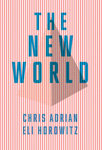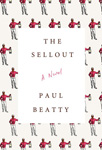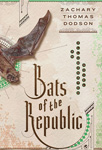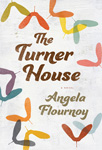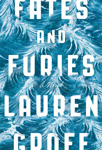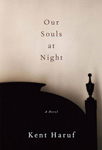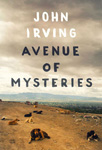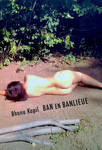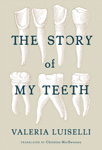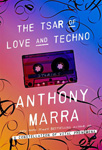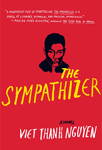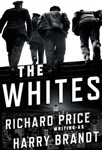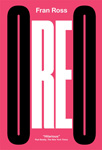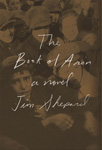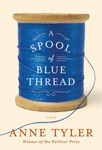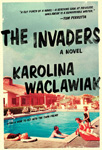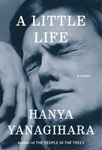by Chris Adrian and Eli Horowitz
Buy it at Powell’s »Syreeta McFadden: “If I had to choose”—GAH!
It’s a paradox: Deciding between Flournoy’s debut epic family drama, weaving silences surrounding black migration and depression, and Beatty’s biting wizardry of a deconstruction of the post-post-black life of the Obama era is actually as much win-win as it is lose-lose. We were blessed as judges to read two of the best books published in 2015. This is not hyperbole. And isn’t that the embodiment of the American identity experiment? If you, fair readers of the Rooster, never fully grasped what DuBois meant by “double consciousness,” may the lives of the Turner clan and the acerbic, intellectual, and darkly comic wisdom of The Sellout serve as your teachers. Two wonderful and smart renderings of contemporary American life. I love these books and I’m SO torn. And what a great moment for me to be torn between two authors who make my universe known and deeply felt.
*deep breaths*
The Turner House has my vote.
| The Turner House | The Sellout |
|---|---|
| 1 | 0 |
Daniel Wallace: Two great books, but my vote goes to The Sellout. There’s not a single sentence in it I wouldn’t have sold my glass eye collection to have written.
| The Turner House | The Sellout |
|---|---|
| 1 | 1 |
Maria Bustillos: The Turner House is an estimable family saga. But to an American woman of Latin descent who loves teasing her Cuban mother by asking her to repeat, in English, “Sure, I’ll share a chair!” Paul Beatty comes like a long-lost brother. I’m still drunk on The Sellout. I’m so happy this book exists from every perspective I can think of—aesthetic, stylistic, political, racial, intellectual, every which way; it’s a book that rejoices in and laughs about and honors our differences, instead of making a straitjacket of “tolerance” for everyone to wear. Bless you Paul Beatty, and thank you.
| The Turner House | The Sellout |
|---|---|
| 1 | 2 |
Jess Zimmerman: I liked The Turner House a lot but did not find it transcendent, and I know and respect (sometimes from afar) everyone who advanced The Sellout, so I expected my vote to go that way. But WOW is it not for me. It’s sardonic, which I like, but it’s relentlessly, exhaustingly, exaggeratedly sardonic. It just hammers away: HELLO I AM BITING SATIRE. BITE BITE. There are funny lines galore—I bet Paul Beatty is great at Twitter. But I also bet I would mute him after a few weeks because Jesus Christ, dude, enough.
| The Turner House | The Sellout |
|---|---|
| 2 | 2 |
Jeff VanderMeer: I enjoyed The Turner House very much—it’s an excellent first novel that conveys a real sense of place and of character. Elements like the haunting carry through in interesting and entertaining ways. Yet, although exceedingly well-written, the novel felt familiar to me and had a few moments of narrative drift. In the end, I choose The Sellout because although it’s a very different kind of book, it too handled character and place evocatively while surprising me more in both its plot and prose. I’m thrilled that the tournament introduced me to two such wonderful writers, and I plan to read them both in the future.
| The Turner House | The Sellout |
|---|---|
| 2 | 3 |
Wendy Molyneux: Choosing between The Turner House and The Sellout is like having a stranger suddenly come up to you on the street and ask you to choose between your favorite owl and your favorite clock. “What do owls and clocks have to do with each other?” you might ask. I would read 17 more books about the Turners, and I would trade my elbows to have written some of the sentences in The Sellout. Their styles are so different that comparing them is very, very hard. AND YET HERE WE ARE. I’m giving this one to the book I stayed up reading past lights out. The Turner House, you win this one. Sorry, owl.
| The Turner House | The Sellout |
|---|---|
| 3 | 3 |
Jaime Green: Before this judgment, I had already read, loved, and advanced The Turner House. The generosity and richness I loved in that book, its overflowing empathy, are nowhere to be found in the barbed irony of The Sellout. Yet, unlike many readers, or at least many reviewers, I rarely found The Sellout funny. I found it sad, angry, and, until the last 50 or so pages, incredibly difficult to read—so arduous that I was shocked to find myself won over at the end. Beatty’s project is urgent and vital, but I have to go with the book I loved, with its own vital heart: The Turner House.
| The Turner House | The Sellout |
|---|---|
| 4 | 3 |
Kelvin Yu: Both books effectively paint a portrait of modern life in the greater context of racism, poverty, addiction, and systemic oppression. Both are poignant, inventive, and important. It’s apples and oranges, but on this particular day, I’m choosing the orange—The Sellout. In the end, it gets the narrow win for Paul Beatty’s impressive, musical, and agile use of language. I’m not usually a fan of long-form satire, but Beatty managed to grip me for an entire novel with his reality-adjacent city of Dickens, Calif. Hominy Jenkins is a big swing of a character and, for me, it connected.
| The Turner House | The Sellout |
|---|---|
| 4 | 4 |
John Taylor: The Turner House is a lovely novel that doesn’t draw much attention to itself, a wallflower that coyly glances, enticing you over. The Sellout, in contrast, practically grabs you by the lapels, jerking you from scene to scene, insistent that you listen. The Turner House is elegant, The Sellout lurching, with some difficulty sustaining its acid tone past the halfway point. So which wins, quiet and beautiful or flashy and overbearing? While both are necessary takes on different aspects of contemporary African-American life, I think The Sellout is the more vital of the two, the novel this moment needs and the one that will stick with me. Hopefully winning the Rooster will get it into more people’s hands.
| The Turner House | The Sellout |
|---|---|
| 4 | 5 |
Doree Shafrir: A book can be an Objectively Good Book, winning all sorts of awards and getting every accolade, and you could still be like: Why am I finding this to be such a slog? Yes, that’s right: I found The Sellout to be a kind of “drink this, it’s good for you” book that I wanted so badly to like but [whispers] it just left me cold. And maybe that was the point, but I prefer my social critique served up like The Turner House does it—warm and funny and brilliantly, beautifully written, about people (and a city) whose problems are at once quotidian and very high-stakes. So the contest here was no contest: The Turner House all the way.
| The Turner House | The Sellout |
|---|---|
| 5 | 5 |
Choire Sicha: From word one I loved Paul Beatty’s relentless unwillingness to not make a joke out of everything. It’s rude and silly and grossly male but vicious, and it sounds great all along, like acid rain on the last tin roof. ANOTHER ONE FOR THE SELLOUT.
| The Turner House | The Sellout |
|---|---|
| 5 | 6 |
Miriam Tuliao: Understatedly lyrical, The Turner House tells the story of one family’s history, dreams, despairs, fears, betrayals, and hopes. While Flournoy’s poetic optimism is as refreshing as “newly arrived spring,” Beatty’s satirical writing about a social scientist, his son, race, and class, is utterly distinct and disturbingly good. The Sellout, a wild challenging ride of a read, is my hands-down winner.
| The Turner House | The Sellout |
|---|---|
| 5 | 7 |
Lizzie Molyneux: Like the young, sexy contestants on The Bachelor and The Bachelorette, here I am with two books, one rose—I mean vote—ready to get down on bended knee and deliver my final decision. Both The Turner House and The Sellout are amazing books that any of us would be lucky to end up with, and that’s exactly what makes this decision so hard. Both are worth reading. My truth: The Turner House roped me in faster and was a story I loved very easily, but The Sellout really earned my affection. It was funny, amazingly written, and most of all, unexpected. Just like finding true love on TV! My final vote goes to The Sellout.
| The Turner House | The Sellout |
|---|---|
| 5 | 8 |
Blake Bailey: The Sellout has a laugh on just about every page, and God knoweth that’s a rare enough thing in our solemn republic. Offhand one thinks of the “Hoi Polloi Translation” for the highly clinical language in the BDSM-IV (Black Diagnostic and Statistical Manual of Mental Disorders, Fourth Edition), and thus the layman understands “Attachment Disorder” as follows: “The nigger flinches or jumps whenever you touch him.” I was also tickled by the hijinks of Hominy Jenkins, “the last surviving member of the Little Rascals,” and I was impressed that the author seemed to prophesy a time, not so long in coming as it happened, when Clarence Thomas would actually speak during a Supreme Court hearing (his doing so in behalf of African Americans, however, as in the novel, is a little hard to swallow). On the other hand, the book’s plot is a pretty thin wire on which to hang these gags, and I can’t say I agree with the jacket copy that it’s a work “of vital import.” Therefore I cast my vote—not without a twinge of regret—in favor of craft and coherency, to wit The Turner House.
| The Turner House | The Sellout |
|---|---|
| 6 | 8 |
Danielle Henderson: There’s nothing I love more than complicated families (The Turner House) and artistic weirdos at the end of their rope (The Sellout), so this was an incredibly difficult choice. Both stories do a glorious deep dive on the joys and plight of the modern black family. Angela Flournoy deftly conveys a rich history, but I was ultimately struck by Paul Beatty’s wild and hilarious construction of a character constantly bulging at the seams. My final vote is for The Sellout.
| The Turner House | The Sellout |
|---|---|
| 6 | 9 |
Brad Listi: Two great finalists, both deserving, and I am, as usual, torn. All praise to Angela Flournoy’s The Turner House, but my vote, in the end, goes to Paul Beatty and The Sellout, which is, I feel, an incredibly rare beast: a wicked and beautifully realized satire, a work of incredible voice and intellect that manages to be, from beginning to end, so wonderfully, savagely funny. It also remapped the landscape of my hometown for me, showing me Los Angeles in ways I’d never quite seen before, holding up a funhouse mirror, making me rethink where I stand. You can’t ask much more than that from a book. Or at least I can’t. Congrats to both finalists, and a hearty salute to Paul Beatty.
| The Turner House | The Sellout |
|---|---|
| 6 | 10 |
Kit Rachlis: Both Angela Flournoy’s The Turner House and Paul Beatty’s The Sellout share a similar ambition: to convey the upside-down life of post-Civil Rights America—or, perhaps that’s post-post-Civil Rights America—a country equally capable of electing its first black president and killing young black men with impunity. But it is hard to imagine two novels with such radically distinct voices. The Turner House is as unadorned and elegant as a Shaker table; The Sellout is a caustic, take-no-prisoners speed riff. As sharply observed and as emotionally astute as I found The Turner House, The Sellout is a bravura performance. Drawing on everybody from Mark Twain to Ralph Ellison, George Clinton to Bob Dylan, Moms Mabley to Lenny Bruce, Beatty launches one joke after another and spins out one absurd plot twist after another, sparing no one, least of all his readers. The only response is to laugh so hard you’re crying.
| The Turner House | The Sellout |
|---|---|
| 6 | 11 |
Celeste Ng: So this decision was hard. Really hard. Really really really hard. In fact I’m typing it on the morning of the deadline, because I keep going back and forth. Both of these books are important and thought-provoking and deeply enjoyable and flat-out good. I’ll be thinking about (and recommending) both for a long time and a win for either will fill me with joy. But I had to choose. Coin flip? Dice roll? Eeny-meeny-miney-mo? I went with prescient octopus, and came up with: The Turner House.
| The Turner House | The Sellout |
|---|---|
| 7 | 11 |
Liz Lopatto: These are two very different types of books—a family saga and a bonkers full-speed satire. Both were delightful reads. But The Sellout delivers on its genre and premise better than The Turner House. Though both have ambivalent endings, The Sellout’s works better; voice, not plot, drives that novel. An excellent showing from Flournoy, but I think The Sellout is unbeatable this year.
| The Turner House | The Sellout |
|---|---|
| 7 | 12 |
Match Commentary
By Kevin Guilfoile & John Warner
John: ToB headquarters reached out to Paul Beatty for his reaction. Let’s start there.
Paul Beatty: A rooster is an appropriate prize for this book. The East Village Rooster is an endangered species. It would be nice to release this rooster into the wild. In the old days I could have maybe given the rooster to one of the Nuyorican cats down the block who run the community garden like an exclusive social club. There’s still one around somewhere. Roosters, I mean, though you could almost say the same thing about Puerto Ricans, given all the gentrification. Occasionally when I’m up late writing, I’ll hear the lone remaining rooster crow. There’s an owl, too. If the award was an owl, I could solve my rodent problem.
Although I can’t accept the rooster because I am incapable of caring for other living creatures, I still have some annoying questions. Is there a rooster-in-waiting? What happens to him if I don’t pick him? Why a rooster? Because winning the Tournament of Books is like winning a cockfight? There’s lots of cockfighting in The Day of the Locust. Anyway, I can’t tell you how honored I am to have won the Tournament of Books. Any competition that awards a rooster to the winner, knows what the fuck it’s doing. But Heifer (a favorite word, whose meaning I learned when I moved to West LA, as in “After school, I’m kicking that heifer’s ass”) International seems to be doing wonderful things with their livestock. My rooster would just sit here, unfed and un-salsa-music’d, going, “After school, I’m kicking this male-heifer’s ass. He ain’t no Nathanael West.”
So, thank you. This award means a lot to me. And if you happen to pass through the East Village in the late afternoon, you might hear me crowing.
John: An acceptance speech as engaging as the novel itself. I have never been this thrilled by a victory in the tournament, not just because my preferred choice won—since that ultimately isn’t that meaningful—but because we’ve had such a lively exchange about The Sellout, which I just knew was special the moment I cracked its pages.
(For what it’s worth, Beatty’s mention above of Heifer International is because though we do offer our winner a live rooster, if they don’t want him then we make a donation in the winner’s name to charity.)
Kevin: When I first read The Sellout I had two reactions. The first was the familiar joy of discovering a book I loved, and the second (with an eye toward the ToB, where I knew it was destined for the shortlist) was anxiety wondering if others would love it as much. Certainly I knew lots of other people would like it (Beatty’s skills are self-evident), but I guess I wondered if enough people would embrace it enough. Part of that is the subjectivity of humor (particularly satire), which is more unpredictable than a Trump staffer wearing a flank strap. No doubt it was also because of the generally high level of discomfiture and inherent bananas-ness in this story, which put off not a few of the judges above. It only takes one judge to bounce you from the ToB, and I’m glad The Sellout never tripped over that.
On the other hand, sometimes seven judges aren’t enough to save you. The Turner House is really a wonderful novel. I’m trying to think if there has ever been a pair of ToB finalists that I had as much unambivalent admiration for. This process is stupid, but it gets a lot of things right, somehow. Against all logic this final match demonstrates that the ToB hivemind, in Beatty’s words, “knows what the fuck it’s doing.” Consider that the Rooster’s permanent status update.
John: I don’t know if there’s much else to say. It’s been a great tournament, and I think a huge portion of the credit goes to the multiplicity of voices chiming in, our unparalleled commentariat, and also our guests in the booth who have provided a real boost of energy to this year. I think you and I both feel like we sometimes run out of things to say, and it was a real pleasure for me to have the chance to listen to others. Thanks to the folks at The Book Report, Books on the Nightstand, So Many Damn Books, and the Slate Audio Book Club for that.
At the end of some ToBs I’ve posted a watch list of titles on my personal radar for the coming year. I haven’t had time to do a thorough accounting, but a few I’m looking forward to are Barkskins by Annie Proulx, The Girls by Emma Cline, The Underground Railroad by Colson Whitehead, and a Nobody’s Fool sequel from Richard Russo, Everybody’s Fool. TMN’s own Alexander Chee has had perhaps the book of 2016 thus far with The Queen of the Night. I noticed Don DeLillo has a new novel on the horizon, and I just finished the galley of previous ToB competitor Teddy Wayne’s Loner, which was deeply chilling.
Readers, what should we be considering for Rooster 2017?
Kevin: Do you know what I’m doing right now, John? Rereading Dune. I am seriously, seriously behind in my 2016 fiction, but I’m also looking forward to The Girls and the Whitehead and Teddy Wayne’s book. Alexander Chee’s novel I have queued up shortly. John Wray, whose Lowboy had the distinction of being bounced from the Rooster by The Help way back when, is back with The Lost Time Accidents. Samantha Hunt’s Mr. Splitfoot is on my “Definitely Will Read” list. Elizabeth Strout has never been in the ToB, so we’ll be considering My Name Is Lucy Barton, for sure.
I also want to look ahead a little bit and tell everyone about the next novel from ToB co-founder Rosecrans Baldwin, which will be called The Last Kid Left. FSG will publish it sometime in 2017.
John: There were 14 correct guesses in this year’s “Guess the ToB Champ” contest. We used the modern equivalent of divination by chicken bones (i.e., random.org) to declare our winner, Edgar Allen Hoe (Lordpuddle). Field Notes, along with Kevin and I, will be sending you a bunch of goodies, probably unpromptly and in separate packages. Send your mailing info to talk@themorningnews.org so we can take care of that.
Kevin: A reminder to all NYC ToBeliebers that there will be a post-Rooster meetup tonight at 7 p.m. at The Folly. John and I wish we could be there, but everyone have a blast for us. Each year the ToB busts through a new plateau of audience and participation, and every year it gets better. Thank you to everyone for that, and thanks once again to Field Notes, our wonderful sponsor, as well as Powell’s, our book sponsor. They’re the ones who make all of this even remotely feasible. Field Notes still has just a few special-edition ToB 2016 notebooks left in stock—buy one for just $2 and Field Notes will send $4 to the good people at 826 National.
As for the Rooster, he will see you next year.

The official 2016 Tournament of Books T-Shirt by book designer Janet Hansen. Order yours!


